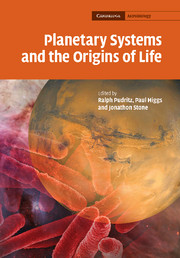Preface
Published online by Cambridge University Press: 13 August 2009
Summary
The inspiration for this book arises from the creation of the Origins Institute (OI) at McMaster University, which formally started operating in July 2004. Many of the greatest questions that face twenty-first century scientists are interrelated in fundamental ways. The OI was established to address several of these major interdisciplinary questions from within a broad framework of ‘origins’ themes: space-time, elements, structure in the cosmos, life, species, and humanity.
The origin of life has a privileged position in this great sweep of scientific endeavour and ideas. It addresses, arguably, the most surprising and most fundamental transition to have arisen during the entire evolution of the universe, namely, the transformation of collections of molecules from the inanimate to animate realm. Substantial progress in solving this great problem has been achieved relatively recently but may be traced back to ideas first proposed by Darwin. The great excitement in our era is the realization that physical properties of planetary systems play an important role in setting the stage for life, and that microbial life, on Earth at least, is incredibly robust and has adapted itself to surprisingly ‘extreme’ conditions. Progress can be traced to four scientific revolutions that have occurred over the last two decades:
the discovery, since 1995, of over 200 extrasolar planets (one which is only 7.5 times more massive than the Earth) around other stars and the possibility that at least a few of these systems may harbour life-sustaining planets;
the discovery of extremophile microorganisms on Earth that have adapted to conditions of extreme temperatures, acidity, salinity, etc., which considerably broadens the range of habitats where we might hope to find life on other planets in our solar system and other planetary systems;
[…]
- Type
- Chapter
- Information
- Planetary Systems and the Origins of Life , pp. xv - xviiiPublisher: Cambridge University PressPrint publication year: 2007

